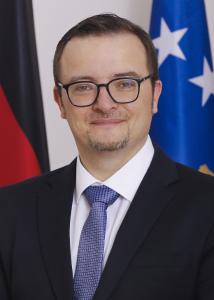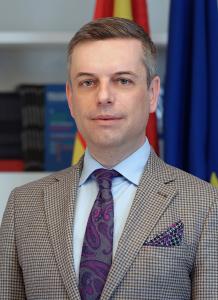The training was opened by Davor Pasoski, Program Manager at the Konrad Adenauer Foundation, who emphasized that the cooperation between KAS and VMRO-DPMNE continues on several different levels. Moreover, Pasoski stressed that this cooperation should contribute to building the capacities of the party, with the aim of creating quality policies in relation to foreign policy and dealing with modern challenges. Stefan Andonovski, Secretary for International Cooperation of VMRO-DPMNE and head of PRAC, also addressed at the opening, and underlined that this module is a continuation of the excellent cooperation between KAS and VMRO-DPMNE, as part of creating new leaders who will successfully lead the party and the country in the upcoming period.
In the second part of the opening, the MPs of VMRO-DPMNE in the Assembly - Ane Lashkoska and Petar Risteski - took part in a panel discussion. Each from their own aspect, spoke about their view in relation to building unity in the Assembly, especially taking into account international cooperation and the representation of the country abroad. The participants agreed that mutual trust is useful for building consensus on particularly important issues for the country and joint and appropriate presentation of this issues during the international activities of the MPs. The speakers also added that all MP groups should be involved in this. As positive examples from the past, the speakers underlined consensually passed resolutions, joint positions, ratifications of international agreements and the representation of the Assembly in interparliamentary groups for international cooperation.
The second day of the Political Academy included quality presentations by domestic experts in the field of international relations, European integration and international negotiations.
The day was opened Ivanka Vasilevska, Member of Parliament and Professor at the Faculty of Law in Skopje. Through discussion and historical narrative, Vasilevska analyzed the country's biggest geostrategic challenges. In a broader historical context, the analysis focused on the challenges facing Europe in relation to the effects of the war in Ukraine on the wider European region.
The attendees were also addressed by Zoran Nechev, Head of the Center for EU Integration of the Societas Civilis Democracy Institute - Skopje, who referred to the European integration of the country, as well as the challenges that appear among candidate countries, as well as in the institutional flows within of the European Union and the member states. Nechev also analyzed the direct relations between the EU and the Western Balkans in the light of new political and security developments.
The special guest on the first day was Emil Dimitriev, former Prime Minister and doctoral candidate in sociological sciences. In the dynamic discussion, Dimitriev reflected on his experience in dealing with major international challenges, such as the migrant crisis from the period of his government management. Dimitriev also focused on the war in Ukraine and the security and economic problems it creates for smaller states, as well as the importance of the membership in NATO.
The day was closed with an interesting workshop on negotiations as one of the basic tools of international relations. After the exhaustive presentation on the basic theoretical characteristics of negotiations as a tool, the group moved to an inclusive workshop in which all participants took part. Conceived as an example of a simulation of multilateral international relations, the workshop tasked all participants to negotiate in defense of their own national interests and fight for the best outcome. The workshop was moderated by Stefan Andonovski.
In the second part of the workshop, which was held on the last day of the Political Academy, the participants analyzed the important aspects of multilateral negotiations, the skills, meaning and characteristics, as well as the methods that are useful for negotiation.
The final day of the second module of the Political Academy was continued by Hristijan Koneski, a lawyer at the Court of Human Rights in Strasbourg. Koneski focused on the significance of the court in the institutional protection of human rights of citizens living in the member states of the Council of Europe. Koneski also addressed the procedures and ways to protect these rights, as well as the effects of the judgments.
In the part of concluding observations of the training, fruitful discussions were concluded by Davor Pasoski, from Konrad Adenauer Foundation and Stefan Andonovski, Head of PRAC "Ljubisha Georgievski". This part included a discussion with the present members regarding the needs and priorities of the political academy.
In that sense, KAS and VMRO-DPMNE continue with the extremely fruitful joint cooperation.


















